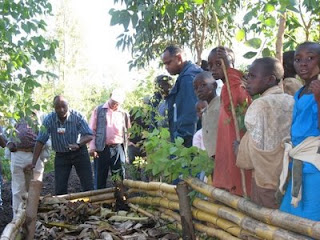
A landlocked, impoverished, densely populated country, Rwanda faces steep challenges in the quest to improve the quality of life of its people, who are mostly small-scale farmers. One solution promoted by the Sustaining Partnerships to enhance Rural Enterprise and Agribusiness Development (
SPREAD) project, which
I visited last month with the leaders of the East Africa Population-Health-Environment (PHE) Network, is helping farmers produce higher-quality crops, which can be sold for premium prices on international markets. In this way, farmers can increase their income by producing
better crops, rather than producing
more—since in Rwanda, there isn’t any more land to go around.
Coffee is Rwanda’s primary export, so SPREAD focuses its efforts there, although it also targets other high-value crops like chili peppers.
SPREAD helps organize farmers into cooperatives with their own bylaws and elected leaders; for instance, the highly successful Maraba cooperative includes 1,400 farmers and their families. Agricultural extension agents show farmers techniques for raising the quality of their coffee. One innovation SPREAD has introduced is coffee bikes, which are specially designed eight-speed mountain bikes that can carry up to 300 kg of coffee cherries. SPREAD found that coffee transported to processing stations on the bikes scored 3.5 SCAA quality points higher than coffee transported by foot or truck, due to shorter average times between harvesting and processing.
SPREAD has provided the impetus for the construction of 120 coffee washing stations (CWS) during the past several years, and has also set up three CWS support centers, which assist with quality control. Washing coffee before and after fermentation is key to preserving its quality. SPREAD has made sure to incorporate a number of environmental initiatives into coffee growing and processing, including mulching coffee trees and digging trenches around them to prevent erosion on Rwanda’s steep hillsides; purchasing new water-efficient coffee-washing machines; filtering the CWS wastewater before releasing it into the river; and using vermiculture (worms) to process coffee pulp and mucilage into organic fertilizer. As SPREAD’s Jean Marie Irakabaho put it, growing coffee without caring for the land is like milking a cow without feeding it.
SPREAD has incorporated family planning (FP) and health initiatives into its agricultural work. The same coffee extension workers who teach farmers how to improve the quality of their coffee have been trained to deliver basic health and FP messages and products to them. Working closely with the district government and local health center, SPREAD staff focus primarily on improving maternal and child health; FP; HIV/AIDS prevention, testing, and treatment; and water, sanitation, and hygiene. A weekly radio program, “Imbere Heza” (“Bright Future”), integrates coffee-growing and health information.
SPREAD, which is funded by the U.S. Agency for International Development and led by the Norman Borlaug Institute for International Agriculture at Texas A&M; University, knows it won’t be around forever, so it is striving to make its improvements to Rwandan livelihoods permanent. It created the Rwanda Small Holder Specialty Coffee Company (RWASHOSCCO), a cooperative-owned company that helps cooperatives market and export their coffee. Specialty Rwandan coffee can now be found in online stores like Land of a Thousand Hills Coffee and Allegro Coffee, as well as in cafes around the world. At the East Africa PHE Network workshop, our coffee breaks featured wonderful coffee from the Maraba cooperative. I encourage all coffee connoisseurs to taste for themselves the delicious results of sustained investment in the livelihoods, agriculture, environment, and health of Rwanda’s coffee farmers!
Rachel Weisshaar attended the meeting of the East Africa PHE Network in Kigali, Rwanda. See previous posts on the New Security Beat: “Rwanda: More Than Mountain Gorillas,” “East Africa PHE Network: Translating Strong Results Into Informed Policies,” and “East Africa Population-Health-Environment Conference Kicks Off in Kigali.”
Photo: Jean Marie Irakabaho (left), chief agronomist and coffee research coordinator at SPREAD, shows the beds where worms are being raised to digest coffee pulp and mucilage, while local children look on. Courtesy of Rachel Weisshaar.
 A landlocked, impoverished, densely populated country, Rwanda faces steep challenges in the quest to improve the quality of life of its people, who are mostly small-scale farmers. One solution promoted by the Sustaining Partnerships to enhance Rural Enterprise and Agribusiness Development (SPREAD) project, which I visited last month with the leaders of the East Africa Population-Health-Environment (PHE) Network, is helping farmers produce higher-quality crops, which can be sold for premium prices on international markets. In this way, farmers can increase their income by producing better crops, rather than producing more—since in Rwanda, there isn’t any more land to go around.
A landlocked, impoverished, densely populated country, Rwanda faces steep challenges in the quest to improve the quality of life of its people, who are mostly small-scale farmers. One solution promoted by the Sustaining Partnerships to enhance Rural Enterprise and Agribusiness Development (SPREAD) project, which I visited last month with the leaders of the East Africa Population-Health-Environment (PHE) Network, is helping farmers produce higher-quality crops, which can be sold for premium prices on international markets. In this way, farmers can increase their income by producing better crops, rather than producing more—since in Rwanda, there isn’t any more land to go around. A Publication of the Stimson Center.
A Publication of the Stimson Center.

 A landlocked, impoverished, densely populated country, Rwanda faces steep challenges in the quest to improve the quality of life of its people, who are mostly small-scale farmers. One solution promoted by the Sustaining Partnerships to enhance Rural Enterprise and Agribusiness Development (
A landlocked, impoverished, densely populated country, Rwanda faces steep challenges in the quest to improve the quality of life of its people, who are mostly small-scale farmers. One solution promoted by the Sustaining Partnerships to enhance Rural Enterprise and Agribusiness Development (

